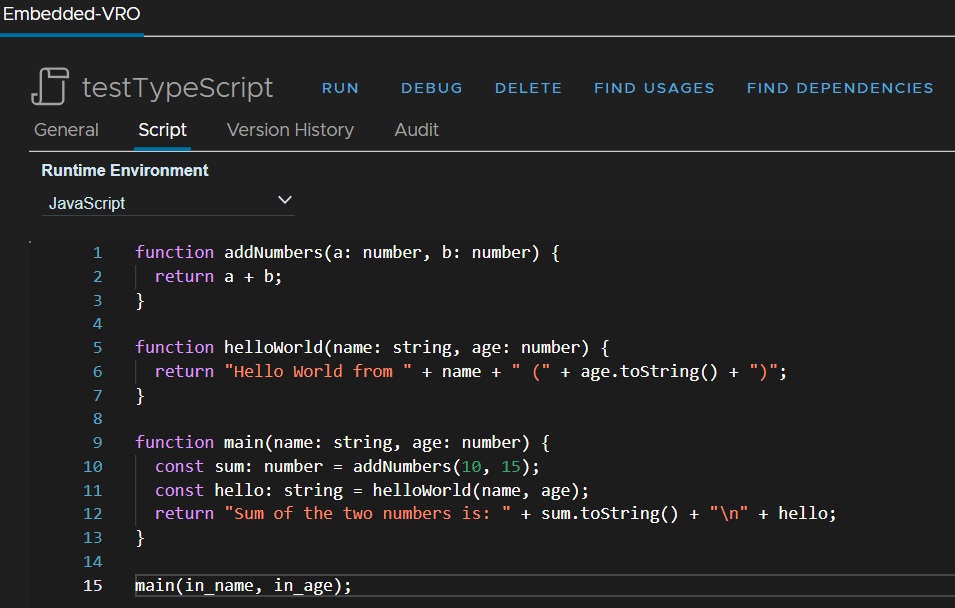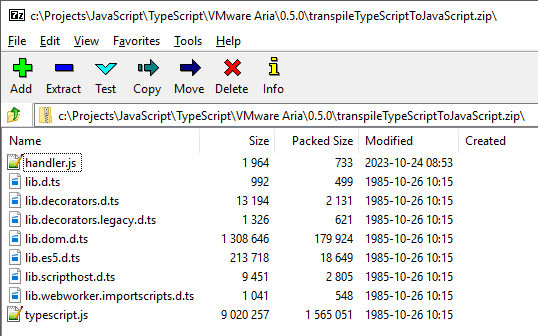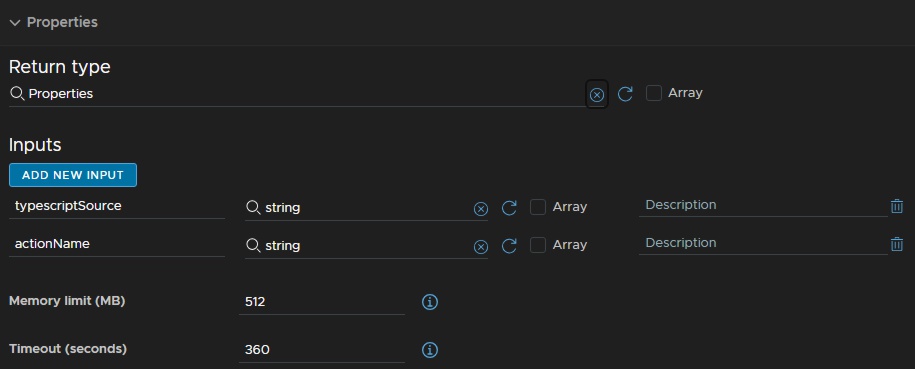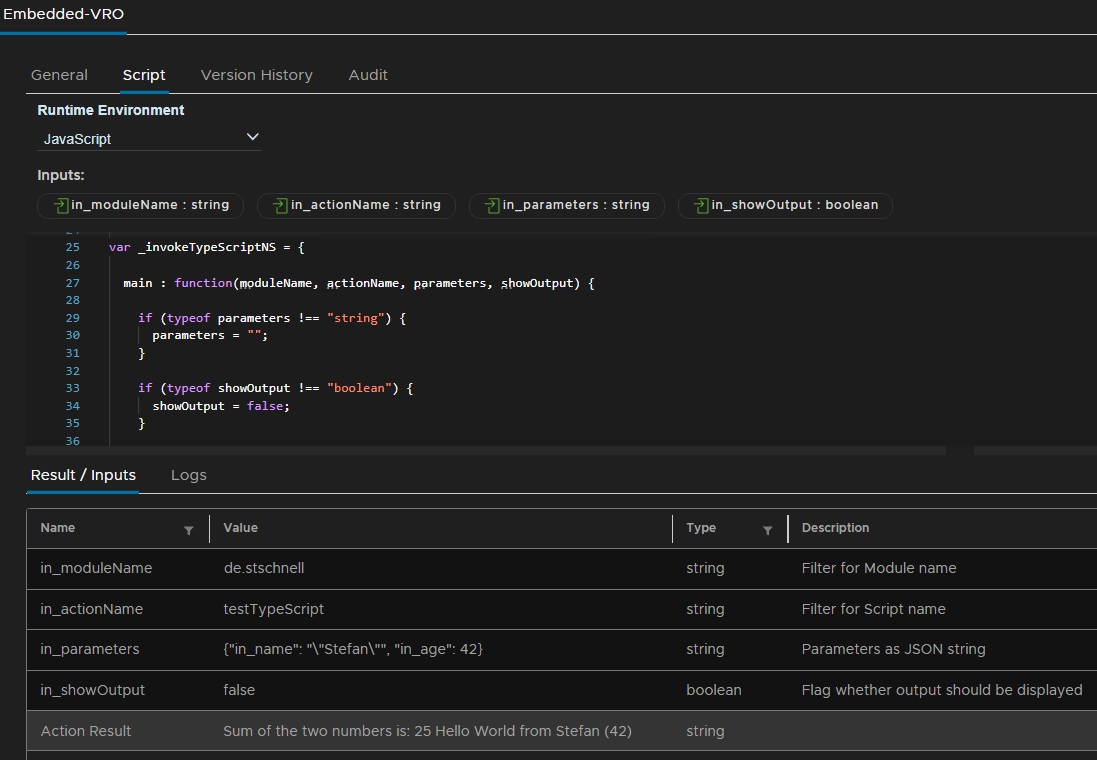/**
* Invokes TypeScript code mixed with Aria Automation objects.
*
* @function invokeMixScript
*
* @param {string} in_userName - Name of the user
* @param {SecureString} in_password - Password of the user
* @param {string} in_moduleName - Name of the module which contains the action
* @param {string} in_actionName - Name of the action
* @param {Array.<{name:string, type:string, value:{objectType:{value:Any}}}>}
* in_parameters - Parameters as JSON
* @param {string} in_outputType - Type of the return value
* @returns {Properties}
*
* @author Stefan Schnell <mail@stefan-schnell.de>
* @license MIT
* @version 0.7.0
*
* Set com.vmware.scripting.javascript.allow-native-object in the
* system properties to true.
*
* Checked with Aria Automation 8.16.0
*/
var _actionActivities = function() {
this._url = null;
var fqdn = this.getFQDN();
if (fqdn !== null) {
this._url = "https://" + fqdn;
} else {
throw new Error("Error at FQDN detection");
}
this._httpRestHost = null;
if (this._url !== null) {
this._httpRestHost = RESTHostManager.createTransientHostFrom(
RESTHostManager.createHost("dynamicRequest")
);
this._httpRestHost.operationTimeout = 60;
this._httpRestHost.connectionTimeout = 30;
this._httpRestHost.hostVerification = false;
this._httpRestHost.url = this._url;
}
this.bearerToken = null;
};
_actionActivities.prototype = {
/**
* Detects the Full Qualified Domain Name (FQDN)
*
* @function getFQDN
*
* @returns {string} FQDN
*/
getFQDN : function() {
var fqdn = "";
var jvmOpts = java.lang.System.getenv("JVM_OPTS");
if (jvmOpts !== null) {
var options = jvmOpts.split(" ");
options.forEach( function(option) {
if (option.substring(0, 19) === "-Dvco.app.hostname=") {
fqdn = option.substring(19, option.length);
}
});
}
if (fqdn !== "") {
return fqdn;
} else {
return null;
}
},
/**
* Retrieves Bearer token
*
* @function retrieveBearerToken
*
* @param {string} username - Name of the user
* @param {string} password - Password of the user
*/
retrieveBearerToken : function(username, password) {
if (this._url === null) {
return;
}
var httpRestHost = this._httpRestHost.clone();
var jsonLogin = {
"username": username,
"password": password
};
var login = JSON.stringify(jsonLogin);
var request = httpRestHost.createRequest(
"POST",
"/csp/gateway/am/api/login?access_token",
login
);
request.contentType = "application/json";
var response = request.execute();
if (response.statusCode === 200) {
var oRefreshToken = JSON.parse(response.contentAsString);
var refreshToken = "{\"refreshToken\":\"" +
oRefreshToken.refresh_token + "\"}";
request = httpRestHost.createRequest(
"POST",
"/iaas/api/login",
refreshToken
);
request.contentType = "application/json";
response = request.execute();
if (response.statusCode === 200) {
var oBearerToken = JSON.parse(response.contentAsString);
this.bearerToken = oBearerToken.token;
} else {
System.error("Error at retrieving bearer token");
}
}
},
/**
* Creates a new action
*
* @function createAction
*
* @param {string} moduleName - Module name that should contain the action
* @param {string} actionName - Name of the action to be created
* @param {string} code - Source code in the action
* @param {Array.<{name:string, type:string, value:{objectType:{value:Any}}}>}
* in_parameters - Parameters as JSON
* @param {string} outputType - Type of return value
* @returns {string} actionId
*/
createAction : function(
moduleName,
actionName,
code,
parameters,
outputType
) {
var _parameters = [];
if (parameters instanceof Array) {
_parameters = JSON.parse(JSON.stringify(parameters));
}
if (typeof outputType !== "string") {
outputType = "string";
}
var httpRestHost = this._httpRestHost.clone();
// Deletes value column from parameters array
if (_parameters.length > 0) {
_parameters.forEach( function(parameter) {
delete parameter.value;
});
}
var jsonScript = {
"name": actionName,
"module": moduleName,
"version": "0.1.0",
"description": "Test",
"script": code,
"input-parameters": _parameters,
"output-type": outputType
};
var script = JSON.stringify(jsonScript);
// API Documentation > Orchestrator > Actions Service
var request = httpRestHost.createRequest(
"POST",
"/vco/api/actions?uniqueName=false",
script
);
request.contentType = "application/json";
request.setHeader("Accept", "application/json");
request.setHeader("Authorization", "Bearer " + this.bearerToken);
var response = request.execute();
if (response.statusCode === 201) {
var jsonResponse = JSON.parse(response.contentAsString);
return jsonResponse.id;
} else {
System.error("Error creating action");
throw new Error("Error creating action");
}
},
/**
* Runs an action
*
* @function executeAction
*
* @param {string} actionId
* @param {Array.<{name:string, type:string, value:{objectType:{value:Any}}}>}
* in_parameters - Parameters as JSON
* @returns {string} executionId
*/
executeAction : function(actionId, parameters) {
if (!Array.isArray(parameters)) {
parameters = [];
}
var httpRestHost = this._httpRestHost.clone();
var jsonBody = {
"parameters": parameters,
"async-execution": false
};
var body = JSON.stringify(jsonBody);
// API Documentation > Orchestrator > Actions Service
var request = httpRestHost.createRequest(
"POST",
"/vco/api/actions/" + actionId + "/executions",
body
);
request.contentType = "application/json";
request.setHeader("Accept", "application/json");
request.setHeader("Authorization", "Bearer " + this.bearerToken);
var response = request.execute();
if (response.statusCode === 200) {
var jsonResponse = JSON.parse(response.contentAsString);
return jsonResponse;
} else {
System.log("Error at execution\n" + response.contentAsString);
}
},
/**
* Retrieves the definition of an action
* Hint: In this case this call is used to check if the action has
* been created.
*
* @function getAction
*
* @param {string} actionId
* @returns {number}
*/
getAction : function(actionId) {
var httpRestHost = this._httpRestHost.clone();
var request = httpRestHost.createRequest(
"GET",
"/vco/api/actions/" + actionId
);
request.setHeader("Accept", "application/json");
request.setHeader("Authorization", "Bearer " + this.bearerToken);
var response = request.execute();
return response.statusCode;
},
/**
* Gets the action run logs
*
* @function getActionLog
*
* @param {string} executionId
* @returns {string} log
*/
getActionLog : function(executionId) {
var httpRestHost = this._httpRestHost.clone();
var request = httpRestHost.createRequest(
"GET",
"/vco/api/actions/" + executionId + "/logs?maxResult=2147483647"
);
request.setHeader("Accept", "application/json");
request.setHeader("Authorization", "Bearer " + this.bearerToken);
var response = request.execute();
if (response.statusCode === 200) {
return response.contentAsString;
} else {
System.log("Error at get log");
}
},
/**
* Deletes an action
*
* @function deleteAction
*
* @param {string} actionId
*/
deleteAction : function(actionId) {
var httpRestHost = this._httpRestHost.clone();
var request = httpRestHost.createRequest(
"DELETE",
"/vco/api/actions/" + actionId
);
request.setHeader("Authorization", "Bearer " + this.bearerToken);
var response = request.execute();
if (response.statusCode !== 200) {
System.log("Error at deletion");
}
}
};
function main(
userName,
password,
moduleName,
actionName,
parameters,
outputType
) {
if (
String(userName).trim() !== "" &&
String(password).trim() !== "" &&
String(moduleName).trim() !== "" &&
String(actionName).trim() !== ""
) {
// Retrieve Bearer token
var actionActivities = new _actionActivities();
actionActivities.retrieveBearerToken(userName, password);
if (actionActivities.bearerToken === null) {
throw new Error("No Bearer token available");
}
var code = System.getModule("de.stschnell").getActionAsText(
moduleName,
actionName
);
if (String(code).trim() === "") {
throw new Error("The action contains no code");
}
var transpiledCode = System.getModule("de.stschnell")
.transpileTypeScriptToJavaScript(code, actionName).javascriptSource;
// Create action with random name in temp module
// Hint: The module temp must exist
var tempActionName = "x" + System.nextUUID().replace(/-/g, "_");
var actionId =
actionActivities.createAction(
"temp",
tempActionName,
transpiledCode,
parameters,
outputType
);
// Wait until action exists
while (actionActivities.getAction(actionId) !== 200) {
System.sleep(1000);
}
// Execute action
var response = actionActivities.executeAction(
actionId,
parameters
);
var executionId = response["execution-id"];
// Delete action
actionActivities.deleteAction(actionId);
System.sleep(2500);
// Read action log
var actionLog = actionActivities.getActionLog(executionId);
return {
"returnType": response["type"],
"returnValue": JSON.stringify(response["value"]),
"executionId": executionId,
"actionLog": actionLog
};
} else {
throw new Error(
"userName, password, moduleName or actionName argument can not be null"
);
}
}
// Main
return main(
in_userName,
in_password,
in_moduleName,
in_actionName,
in_parameters,
in_outputType
);
|






